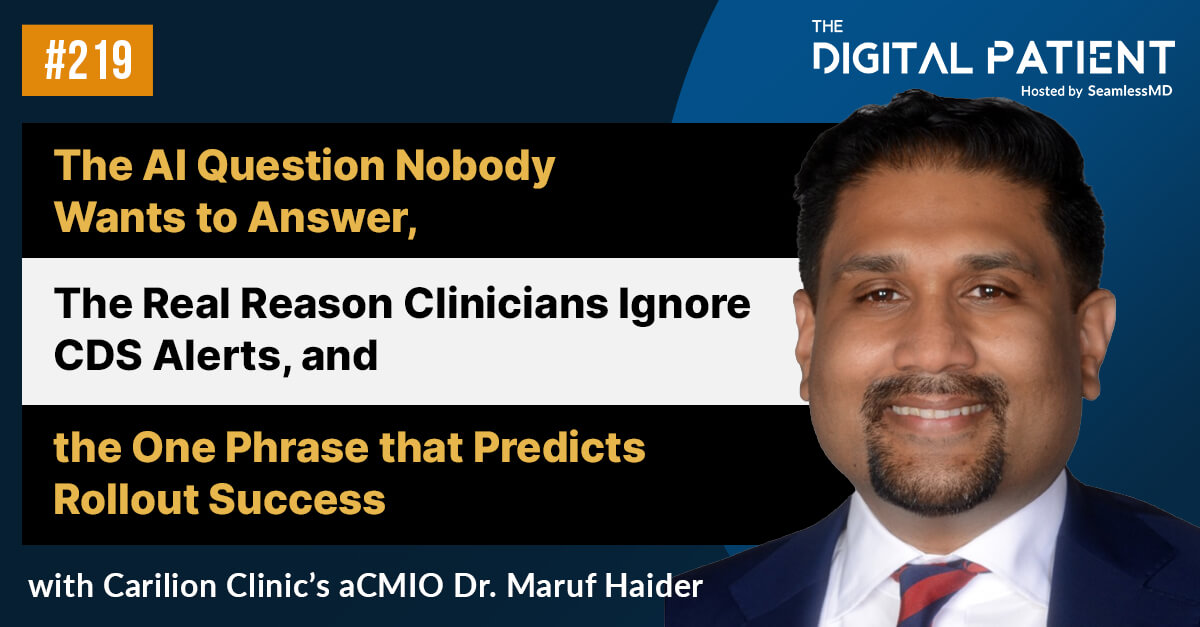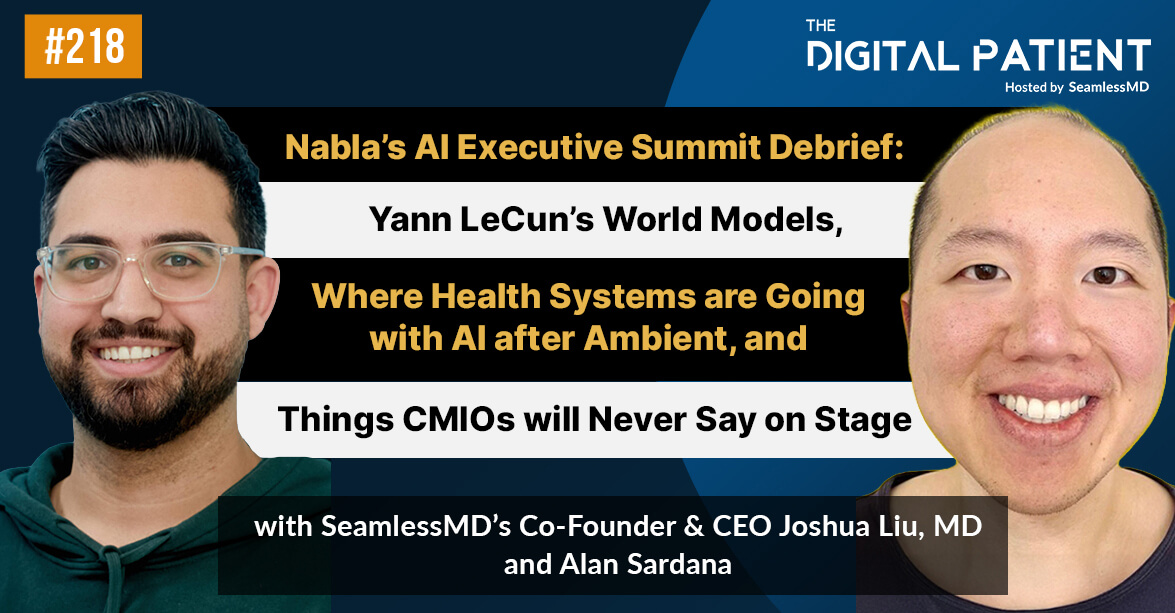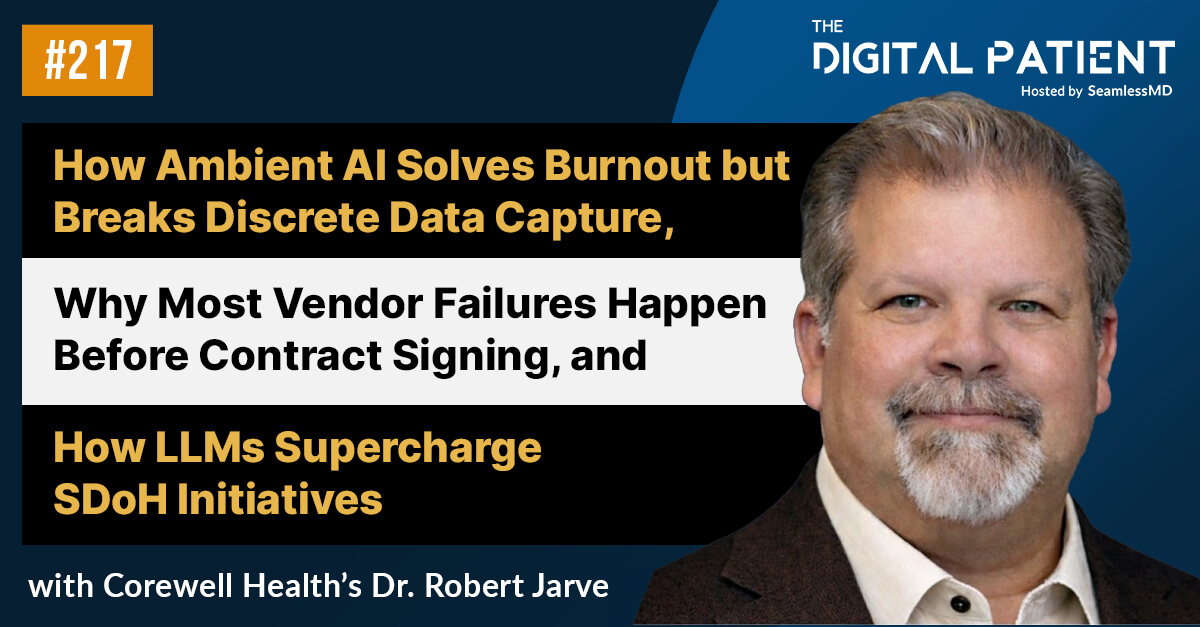Subscribe on: RSS | SPOTIFY | APPLE PODCAST | GOOGLE | BREAKER | ANCHOR
On this episode of "The Digital Patient" podcast, hosts Alan Sardana & Dr. Joshua Liu speak with Dr. CT Lin, Chief Medical Informatics Officer at UCHealth, about "Measuring and Benchmarking Clinician NPS, Augmenting CDS with AI, Making Clinical Informatics Fun, and more..." Click the play button to listen or read the show notes below.
Audio:
Video:
Guest(s):
- Dr. CT Lin (@ctlin1), Chief Medical Informatics Officer at UCHealth
- Dr. Joshua Liu (@joshuapliu), Co-founder & CEO at SeamlessMD
Episode 96 - Show Notes:
[00:00] Introducing Dr. CT Lin, CMIO at UCHealth;
[01:37] How Dr. Lin ventured into the world of musical parody after finding a ukulele while in Hawaii and writing “Epic Man”, a take on Elton John’s Rocket Man, to help clinicians prepare their checklist before going live on Epic;
[05:37] Why Dr. Lin believes information transparency has been the most impactful transformation in healthcare due to its ability to provide efficient access to patient information through electronic medical records, replacing the reliance on physical paper charts;
[08:39] How Dr. CT Lin's SPPARO (System Providing Patients Access to Records Online) project, which aimed to provide patients access to their medical records online, resulted in increased patient trust and loyalty without an overwhelming increase in workload for healthcare professionals, but faced resistance from some physicians despite positive patient feedback;
[13:46] How Dr. Lin grew UCHealth's medical informatics department overtime from a one person team to 23 part-time clinicians and part-time informaticists, emphasizing change management in their deployment of technology and emphasizing the importance of building outstanding relationships in driving progress forward;
[16:41] Why Dr. Lin implemented UCHealth's EHR optimization Sprint program to improve the functionality and acceptance of the EHR, emphasizing teamwork and collaboration, and understanding that 80% of the improvement comes from how people use the technology as opposed to technological changes;
[20:44] How Dr. Lin and UCHealth has found success in hiring clinically effective leaders and training them on informatics, rather than solely relying on individuals with programming expertise, as clinician leaders have more understanding of workflow and garner more respect from their peers;
[23:08] Why Dr. Lin believes “pajama time” is a suboptimal metric to equate with physician burnout as some physicians prefer to finish their work at home after having dinner with their family, and how he suggests incrementally knocking down workload, automating tasks, improving teamwork, and simplifying processes can alleviate some physician burnout;
[28:05] How organizations like Stanford have started benchmarking NPS between organizations’ healthcare IT teams doing wellness surveys, including benchmarking of satisfaction with EHR efficiency and effectiveness;
[29:46] How Dr. Lin introduced the APSO note format to address the inefficiency of electronic health records, faced initial resistance, but increased adoption to ~90% in their organization after transitioning to Epic and mandating its use;
[33:00] How Dr. Lin was inspired by Simon Sinek's "Start with Why" TED talk, and now uses the SBAR format (situation, background, assessment, recommendations) to structure his writing, starting with an executive summary that outlines the purpose and urgency of the proposal, which has significantly increased his ability to make effective changes;
[34:22] Why Dr. Lin compiled a “My Failure Resumé” to chronicle and embrace the failures in his career, which have propelled him forward, sharing one failure – the unsuccessful implementation of radiology indications of use, which, a decade later, has finally succeed with the help of AI and user testing;
[38:19] Why Dr. Lin is excited about the potential of chatbots powered by AI language models like GPT-3 to help augment clinician decision-making and respond to patient inquiries more efficiently, but cautions that there are still accuracy and intent issues to be addressed before they are ready for widespread use;
Fast 5 / Lightning Round:
- What is your favorite book or book you’ve gifted the most?
"Ender's Game" by Orson Scott Card
- Who is a person–dead or alive–you’d love to meet?
"Skip"
- Would you rather have Super strength, super speed, or the ability to read people’s minds?
"Super speed so that I could travel into the future”
- What is something in healthcare you believe that others might find insane?
“Misaligned incentives and motivations”
- If you could travel back in time to any event or moment, what would it be and why?
"Cultural change is the most fascinating to me... I would have loved to have been around when the Copernican model replaced Ptolemy's model."
.svg)










.png)
